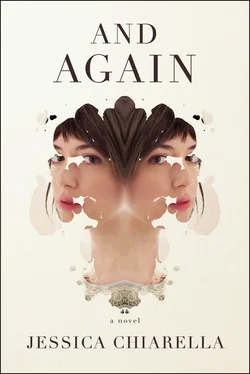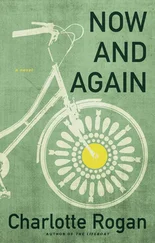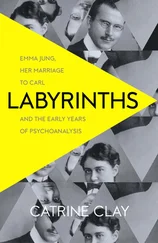I don’t like it anymore. Not that I ever particularly loved it, but I feel now an active repulsion when I flick on the lights and shut the door behind me. It’s nothing like the apartments I had in L.A., even the little place I’d shared with another model when I first moved into the city. That place had been cramped and hot, with foggy windows and a communal pool that was always overrun with algae and dead leaves. We’d slept on mattresses on the floor, she and I, with a curtain hung on a wire between us to divide the room. But it had a view of the Hollywood sign and it had been unfailingly sunny, like everything in California. And after growing up in a trailer, it might as well have been Buckingham Palace.
This apartment only ever served as a place for me to convalesce. I moved out of L.A. as soon as my disease started to show, as soon as the people around me began to back away. People could tolerate a lot in that city, but a beautiful woman’s descent into the grotesque was not acceptable, at least not in the industry. And people were still a bit afraid of my particular strain, which had developed a resistance to nearly all of the standard medical treatments. So I retreated back to Chicago, abandoning the sea air and the mountains and the sunshine for a tiny studio apartment in Uptown that seemed like a good place to die. And this was the apartment I’d chosen, because it was cheap enough to be covered by my Social Security checks and nothing about it reminded me of California.
It has a smell, like dying flowers, like something sweet rotting. I never really noticed it before. Now, with all of my senses sharp and new, it assails me in the doorway and has me trying to force open my windows, a futile endeavor, as they’ve been painted shut since before I lived here. I’d never cared much what my apartment looked like. But now everything around me, from my threadbare couch to the yellowing tile in my kitchen to my leaky, moldering bathtub, seems to be suffused with disease. It never occurred to me before how dim my apartment is. My bed is unmade and my sheets smell sour. I strip it down to the mattress and haul the bedding to the first floor laundry room, throwing it into the washer with a few capfuls of bleach, enough to make my nostrils sting from the fumes, but at least it’s better than the other smell.
Upstairs, I root around under my sink until I find a soft cardboard box full of trash bags. I’d left a half-full can of garbage in my kitchen before I checked into the hospital, and now it’s teeming with fruit flies and reeks so badly it makes my eyes water as I bag it up and rush to the trash chute in the hallway. Another survey of the space under my sink produces a bottle of kitchen spray and a can of Ajax, and even though it’s three in the morning I begin to tear into my apartment with the fury of a meth addict in an after-school special. This place is unsuitable I think, again and again, unsuitable for the person I am now. I should be back in L.A., where I could open the window and smell hot wind and desert flowers. I should live in a place decorated with silk curtains and ornate mirrors, with a wrought-iron bed frame and huge photographs hanging on the walls. It was what I told myself again and again as a child, sleeping in the stagnant air of my mother’s trailer, listening to motorcycle engines and angry voices drifting in through my window. I told myself I belonged somewhere beautiful, that God had made a mistake when I was born there. That was back when I believed in God.
I sleep on my couch when I’m finally exhausted, too drained to retrieve my sheets from the laundry room. I hope they’ll still be there in the morning, though I doubt it. At least the place smells better now, the odor of rot beaten away by the sharp, acrid scent of ammonia and the treacly lavender of my kitchen cleaner. Everything is still dingy, though, battered away by years of activity. I think of all the hours I’ve spent here, all the endless days shuffling around, wearing down the cushions of my couch, eating out of delivery containers and not seeing the sun for weeks at a time. How easy it was to remove myself, almost completely, from the world around me. I chose to be absent, when even Dr. Grath had been finding his way around the city without his eyes. What a coward I was, I think. How weak.
I don’t sleep well. It’s a terribly uncomfortable couch. Things don’t really look better in the morning, there’s just a haze of natural light added to accentuate the ugly details of the place. I wonder if I should move, leave everything and start over somewhere else. It’s a fleeting thought. The only person in the world who knows me lives right across the hall. And, no matter how much I’ve changed, I’m not prepared to give that up yet.
David Jr. looks like a young bird in the light of his computer, making his skin a pale blue and his black eye look even bigger. His soft, fair hair is mussed, and he can’t keep his hands out of it. It makes him seem nervous, the way he plays with his hair, digging his fingers through it, twisting tufts until they stick out from his head like thorns. I wonder if he is nervous, talking to this man who resembles his father in only shadowy, utilitarian ways.
He has always been small for his age, my son. He was born nearly six weeks premature, and even after he outgrew the delicate, alien visage of those first weeks he never quite caught up to the other kids his age. I think of how he must look to the other boys in his class, like he’s made of china, like he could break if you handled him just a bit too roughly.
The image of his split lip is glaring magenta on the computer screen. It makes me furious to see this sort of damage to my son’s face, first at the little fucker who hit him and then, irrationally, at my son for being such an easy target. For being too much like me, at his age, with a father too disinterested to teach me how to avoid getting my ass kicked. It’s a shameful feeling, being angry with my son because he got hurt, because I haven’t been around enough to teach him all of the things I was forced to learn for myself.
“Mom said it was you who started it,” I say, trying to coax some sort of satisfactory explanation from him. He nods, fingers curling into the hair above his right ear.
“They were laughing at me.”
“Who is ‘they’?” I ask.
“Jimmy and Bradley Simmons. A few others,” he replies. I know those little shits. They look like they could be in high school, though they have the intellect of second graders. Their father owns a company that manufactures tractors, one of those unlikeliest of success stories, in which someone with very few valuable faculties makes millions by accident alone. The sort of success story that makes me wild, burns in me like chemical waste, goring holes in my stomach when I think of the way my grandmother toiled for so little. Or my mother, who could read books in Russian, who knew the names of the constellations, whose sadness seemed born of knowing what she could have been if she hadn’t been saddled with a farm and a son and a worthless husband. My mother, who didn’t live to fifty, who didn’t live to see me start high school.
“Jimmy and Bradley Simmons are bigger than you. Why would you try to go after them yourself?” I ask, feeling the sting of my own hypocrisy. I would be riotously proud of my son if he’d had the brawn to go after them and come out on top. David Jr. shrugs. “Come on, you can do better than that. Tell me, why would you start a fight with boys who are twice your size? It’s not a smart move, buddy. You shouldn’t be starting fights you can’t finish.”
“They had a cartoon from the Internet. You were wearing a sheet like a dress, and they were laughing at you,” he says. I know the cartoon he means. The New York Times ran it the week after my rehab story broke. It shows me as an overgrown frat boy, showing up to a vote in a toga with a bottle of whiskey taped to each hand.
Читать дальше












